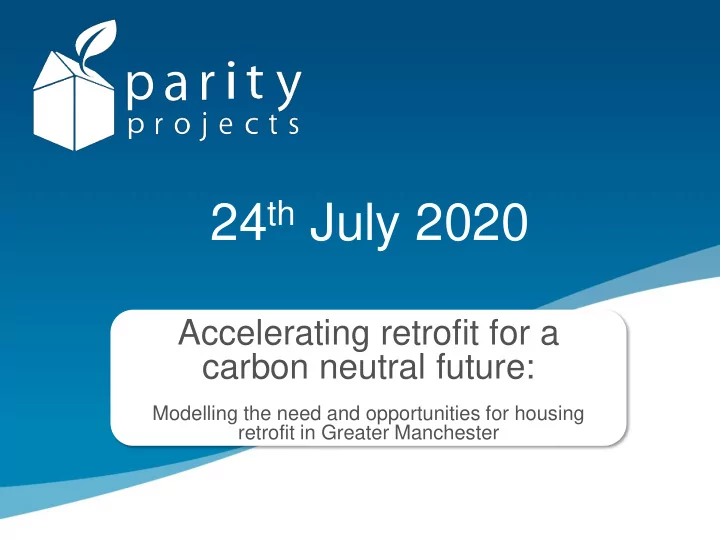

24 th July 2020 Accelerating retrofit for a carbon neutral future: Modelling the need and opportunities for housing retrofit in Greater Manchester
Background • In September 2019, GMCA won £49,980 grant funding from the Local Government Association’s Housing Advisers Programme 2019/20 • The GM Low Carbon Team contributed an additional £35k to extend the the project, to enable future scenarios for energy and CO 2 modelling • GMCA procured and Parity Projects Ltd (with Bays Consulting, ADE Research and Energy Systems Catapult) were appointed in January 2020
Overview Project timescale Feb – Oct 2020, four main streams: ‘Where are we now?’ • An energy model of every home in Manchester • Probability of HHSRS hazards at individual home level ‘Where do we want to get to?’ • the most likely and realistic net zero CO 2 end-result ‘How do we get there?’ • Iteratively model a range of possible policy interventions
Energy model of every home Open EPC data + OS data + LSOA inspection CROHM Data
Energy model of every home
HHSRS hazards at individual home level
Where do we want to get to? More difficult than expected; cannot be determined in isolation from national policy on: • Decarbonisation, capacity and resilience of future electricity grid • Building infrastructure for new technology (e.g. Hydrogen) Our analysis and literature review supports key conclusions in the next few slides
Future housing key conclusions: Gas vs Electricity 1 – There is no place for mineral gas in net- zero housing by 2038 2 – The electricity grid will decarbonize, but will not generate enough for conventional electrical heating
Future housing key conclusions: Heat Pumps and Insulation 3 – Heat Pumps look likely to be key and their roll out needs to dramatically increase, noting that they may not reduce bills much 4 – we don’t need every home to be super-insulated, but high and medium cost-effect measures will be important (and will reduce bills)
Future housing key conclusions: Heat Networks & Home Renewables 5 – Heat Networks can be better than individual heat pumps where the business case is viable (perhaps 15% of homes). GMCA key 6 – some other offsetting PV kWh mechanism – e.g. Heat domestic renewables – is + HW needed for net zero kWh
Future housing key conclusions: Heat Pumps and Insulation 7 – Energy Storage will become important in the longer term as heating from the electricity grid scales up. Distributed? 8 – Hydrogen requires much development, and may be a priority for other sectors before domestic. Fabric and heat pumps are compatible with future hydrogen roll-out.
How do we get there? • Key focus of the project July to September • We are currently modelling the likely effect of different frameworks of policies • Initial work indicates that decarbonisation will need a radically increased ambition compared to programs to date.
David Shewan Parity Projects
Recommend
More recommend